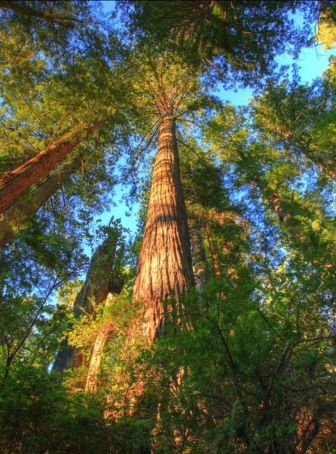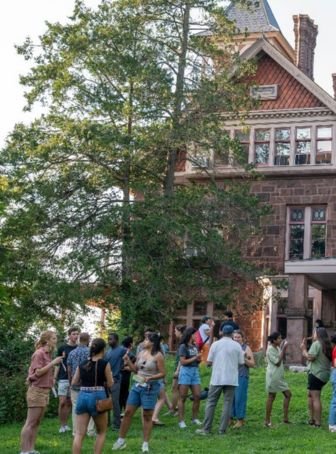
The wildland fires of this summer have been one for the books. Not only have there been high risk and intensity fires, like everything else, COVID 19 has added another layer of complexity, danger, and vulnerability to firefighter health and safety. Recognizing this confluence of stressors, James Puerini, a former federal wildland firefighter and M.F. ‘21, and Gerald Torres, professor of environmental justice at Yale School of the Environment and Yale Law School, teamed up. Puerini and Professor Torres started with an LA Times Op-Ed: “Don’t just cheer wildland firefighters as heroes. Give them affordable healthcare (link is external),” in which they outlined the added risk firefighters face in contracting COVID 19 during grueling, labor and respiratory intensive work and the lack of continuous healthcare to protect firefighters. Because wildland firefighting typically falls under seasonal work, federal healthcare for firefighters lapses when the season is deemed over and premiums to continue healthcare coverage skyrocket for individuals.
From this initial publication, the Yale Wildland Firefighter Rights Initiative was born at the Forest School as a response to not only this intense season but as a place for convening of both Yale Forestry and external organizations, a platform for labor rights advocacy, and a method to demystify fire and forest ecology. At the core of this initiative and its efforts is environmental justice and community building. In Puerini’s words, the Initiative started as a means to “amplify and uplift the collective voice of firefighters.” Puerini along with fellow master’s students Tiana Wilson-Blindman M.E.M. ‘21, Humna Sharif M.E.M ‘21, Leo Goldsmith M.E.M. ‘20, and Cam Humphrey M.E.M. ‘21 co-founded the group, while Professor Torres serves as an active faculty partner and adviser.
On August 3rd, the Yale Wildland Firefighter Rights Initiative in collaboration with the Federal Wildland Fire Services Association hosted the “Wildland Firefighter COVID-19 Workers’ Compensation Roundtable” livestream discussion. As the Initiative’s first major event, the roundtable brought together public lands and labor rights advocates from across the United States around the workers’ compensation process.
To kick off the event, Mark Ashton, associate dean of the Forest School and professor of silviculture, and Gerald Torres made opening remarks. Professor Ashton reminded us of the Forest School’s history. Dating back to Gifford Pinchot, Yale Foresters went out West fighting fires and promoting fire suppression with good intentions but left a legacy that we now need to reassess. Professor Ashton suggested we instead look to Indigenous peoples’ fire use, the positive and negatives of approaches, and reinvent forest fire policies. Professor Torres reminded us of the importance of going to the frontlines and approaching challenges and growth collectively rather than alone. Professor Torres announced that this roundtable was the inaugural event for the forthcoming Center of Environmental Justice at the School.
Puerini moderated the panel while fellow Initiative co-founder Humphrey ran the Q&A discussion. Puerini introduced us to the following panelists, who represented many of the major firefighter and fire ecology labor advocacy groups in the U.S.:
- Casey Judd, President, Federal Wildland Fire Services Association
- Mark Von Tillow, Director of Outreach, Wildland Firefighter Foundation and retired U.S. Forest Service
- Timothy Ingalsbee, Executive Director, Firefighters United for Safety, Ethics & Ecology
- Jude Bayham, Assistant Professor, Colorado State University.
These speakers grounded those of us listening in - making issues facing firefighters accessible to anyone new to wildland fires while also catering to veterans in the field. Three key questions stuck out during the discussion.
Why are wildland firefighters disproportionately impacted by COVID-19?
Jude Bayham explained the additional smoke exposure, difficulties to maintain additional hygiene demands, and the transient movement of firefighters from one fire incident to the next increases risk, and it is difficult to social distancing and screen. Tim Ingalsbee described this work as “inherently dangerous” and “physically arduous” with an accumulative fatigue factor over the course of a season. Firefighters might be working 16 hours a day, suffering from sleep deprivation, losing sense of taste and smell (hallmark symptoms of COVID-19) from smoke inhalation, and have poor nutrition. Right now, firefighters are consuming MREs, which are pre-packaged ready to eat meals often used in military combat for their ability to survive extreme conditions. Ingalsbee underscored that smoke, dirt, and ash inhalation plus additional stressors on the body runs down the immune system, making firefighters particularly susceptible. Further, we should be thinking long-term - what is firefighter health like post-season?
How does workers’ compensation work?
In short, Casey Judd explained it’s a mess. Fire season in and of itself is a misnomer; the season can last year round, making workers’ compensation very difficult to navigate. Mark von Tillow highlighted the cost of healthcare. The average cost for a COVID-19 related hospital stay is $73,000 - who is going to pay for that post-season?
How does this tie into legislation?
All eyes are on the COVID-19 stimulus bills. Firefighters cannot necessarily prove that they contracted the disease while on the job, making it even harder for care to be covered by insurance, and there is currently no post-season protection. Further, Ingalsbee recognized that COVID-19 will persist and so “it’s not viable to send out crews to stomp out every fire” and should instead be sent out strategically. Here enters the proposed S.3910: The COVID-19 as a Presumptive Disease in Wildland Firefighters Act (link is external). This legislation, introduced by Senator Joe Machin whose lead staff advisor is Bryan Petit ‘03 MF, is meant to guarantee the expansion of workers’ compensation benefits and to ensure COVID-19 testing.
The speakers not only shared their expertise and experiences, they brought solidarity and humanity to this deadly issue. Everyone wanted to help their fellow firefighter on the call, cultivating a “we have your back” mentality.
This initiative is just getting started. As described by Wilson-Blindman, the focus of the group is already broadening with the expectation of expansion in the future, Professor Torres, Puerini, Wilson-Blindman, Sharif, Goldsmith, and Humphrey are working on projects and events regarding incarcerated firefighters and the prison industrial complex, Indigenous and Aboriginal community fire management including activity in Northwest Australia, and gender equity, along with involvement in U.S. Congressional efforts around wildland fire. Onward and upward, there is much more to come.
For more on Puerini’s work, read this recent interview (link is external).
To find out about upcoming Fire SIG (Student Interest Group)’s events, check the website (link is external).







